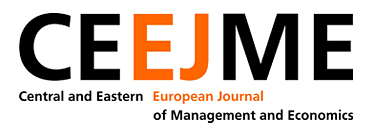CENTRAL AND EASTERN EUROPEAN JOURNAL OF MANAGEMENT AND ECONOMICS
Vol. 4, No. 4 December 2016, WSB UNIVERSITY IN WROCŁAW
Editor: Joost Platje
Contents: PDF download >>
Vol. 4, No.4, 261-280, Dec. 2016
Factors influencing user story estimations: an industrial interview and a conceptual model
Authors: Marek MAJCHRZAK, Lech MADEYSKI
Wroclaw University of Science and Technology, Poland
Article: PDF download >>
Abstract: A proper estimation of time in user stories is a crucial task for both the IT team as well as for the customer, especially in agile projects. Although agile practices offer a lot of flexibility and promote a culture of continuous change, there are always clearly de need timeboxed periods where an IT company has to commit to delivering working soft-ware. Estimating time of user story implementation provides clarity and the opportunity to control the project by the management, yet at the same time, it can increase pressure on software developers. Thus, incorrectly estimated user stories may lead to quality problems including system malfunction, technical debt, and general user experience issues. The paper describes user story characteristics, reasons of user story estimation inaccuracy as well as a model of their potential impact on post-release defects in large IT software ventures, all derived from the conducted interview with practitioners in Capgemini software development company.
Keywords: estimation, user story, agile, defect prediction, Scrum
JEL: C92, G31, D81, D83, C53
Vol. 4, No.4, 281-292, Dec. 2016
Proposal of a methodology enabling application of the COPERT IV method to calculate air emissions from light and heavy duty vehicles, buses, motorcycles and mopeds in Poland
Author: Mariusz TRELA
AGH University of Science and Technology, Kraków, Poland
Article: PDF download >>
Abstract: The paper presents a method of preparation of statistical data in such a manner as to enable application of the COPERT IV method to calculate emissions resulting from the operation of light and heavy commercial vehicles, buses as well as motorcycles and mopeds. The paper also presents the results of calculations of emissions from these vehicles in Poland in 2014, made by means of the COPERT IV method with application of the proposed methodology. The results have been compared with data from emission inventories, and conclusions have been drawn concerning the reasonableness and possibility of applying the proposed methodology.
Keywords: COPERT IV method, pollutants emission, road transport
JEL:
Vol. 4, No.4, 293-305, Dec. 2016
Comparative study of climate change consequences in Poland and in Turkey
Authors: Anna DUBEL
AGH University of Science and Technology, Kraków, Poland
Kaan BAS
Hacettepe University, Ankara, Turkey
Article: PDF download >>
Abstract: The paper presents a comparative study of basic climate change impacts’ categories and analyses of climate change consequences in a structured way in relation to macroeconomic and sustainable development indicators in Poland and in Turkey. Taxonomic distance method was used to compare the basic environmental and economic aspects between the countries. The results of the comparative study of basic macroeconomic and sustainable development indicators were elaborated to provide background for the subsequently discussed identification of the mutual learning possibilities between Poland and Turkey in relation to climate adaptation and climate change mitigation actions. The comparison revealed the resemblance of the countries in many aspects so that the peer learning related to climate change adaptation and mitigation actions could be possible.
Keywords: climate change, taxonomic distance, macroeconomy, sustainable development
JEL: Q54, P52, B41, O11, E01
Vol. 4, No.4,307-319, Dec. 2016
A Polish professional real estate intermediary’s ethics after the deregulation of the profession
Authors: Aleksandra PIASECKA
Opole University, Opole, Poland
Article: PDF download >>
Abstract: In accordance with the legal rules that applied until the end of December 2013, the Polish real estate intermediary was obliged to perform in accordance with these rules as well as professional standards, with particular accuracy and care appropriate for the nature of the profession as well as the principles of professional ethics. On 13 June 2013 Polish Parliament adopted an Act amending the existing law on the exercise of certain professions, abolishing regulation of the profession of real estate intermediary or agent. From 1 January 2014, virtually all requirements became obsolete, like the need to possess a license, to possess proper education, the completion of an apprenticeship and the lack of a criminal record. The question arises how the real estate market coped with compliance with the law as well as professional standards and ethics. The aim of this article is to present proposals for new solutions in the area of professional standards for real estate intermediaries, in response to the changed markets conditions, and to compare the changes in the principles of professional ethics.
Keywords: real estate intermediary, professional ethics, professional standards, real estate market, professional deregulation
JEL: R38, R39
Vol. 4, No.4, 321-332, Dec. 2016
Influence of selected sources of pollutants emissions on the air quality in Cracow
Authors: Mariusz TRELA
AGH University of Science and Technology, Kraków, Poland
Article: PDF download >>
Abstract: The article is an attempt to estimate the emissions of pollutants such as particulate matter (PM), nitrogen oxides (NOx), sulfur dioxide (SO2) and carbon dioxide (CO2) in Cracow in 2015 resulting from the solid-fuel boilers (especially coal fired boilers) and fireplaces and emissions resulting from the operation of road vehicles. Estimated emissions of pollutants were compared with the emissions of plants of significant nuisance to air quality in Cracow. Conclusions have been drawn about the directions of Cracow authority policy in environmental protection.
Keywords: pollutants emission, coal fired boilers, road transport, environmental protection
JEL: Q01, Q53
